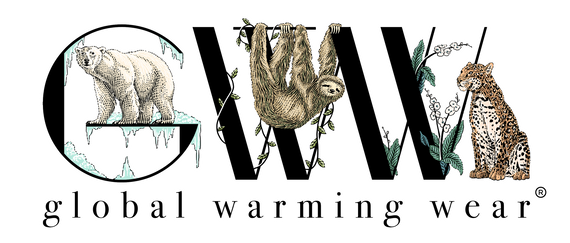Safari Sun Recycled Long-sleeve Crop Top
$72.00
The giraffe is definitely one of the most famous, perhaps well-loved, endangered species. That’s because they aren’t just mammals with a striking appearance and elongated neck, they also happen to be highly intelligent animals! Giraffes can use both vocalizations and bodily gestures to communicate with each other. So why are some estimates showing a 90% decline in giraffe populations? Poaching, and excessive hunting of males disrupt breeding cycles. Endangered Giraffes are being killed for their meat, teeth, hides, bones and brains (a supposed cure for HIV) despite the fact that it is illegal to kill them. Other reasons for this dramatic change include: habitat destruction, human-wildlife conflict, disease transmission, and retaliatory killing due to livestock loss or damage caused by herbivores. The reticulated giraffe found in Ethiopia, Kenya, and Somalia is particularly vulnerable. Global Warming Wear honors this majestic long-necked wonder with a stunning line of giraffe prints. This one is called Safari Sun.
This long-sleeve crop top in our Safari Sun print is made of recycled polyester and elastane, making it an eco-friendly choice for swimming, sports, or athleisure outfits. The crop top has a tear-away care label and a wide, double-layered waistline band for a comfortable fit.
• Fabric composition in Europe: 88% recycled polyester, 12% elastane
• Fabric weight in Europe: 6.78 oz/yd² (230 g/m²)
• Fabric composition in Mexico: 81% REPREVE recycled polyester, 19% LYCRA® XTRA LIFE™
• Fabric weight in Mexico: 7.52 oz/yd² (255 g/m²)
• UPF 50+
• Trendy, cropped fit
• Wide, double-layered waistline band
• Raglan sleeves
• Tear-away care label
• Size up if you’re between sizes as this fabric can be tight on the body
• Blank product components in Europe sourced from Spain
• Blank product components in Mexico sourced from Colombia
This product is made especially for you as soon as you place an order, which is why it takes us a bit longer to deliver it to you. Making products on demand instead of in bulk helps reduce overproduction, so thank you for making thoughtful purchasing decisions!
This long-sleeve crop top in our Safari Sun print is made of recycled polyester and elastane, making it an eco-friendly choice for swimming, sports, or athleisure outfits. The crop top has a tear-away care label and a wide, double-layered waistline band for a comfortable fit.
• Fabric composition in Europe: 88% recycled polyester, 12% elastane
• Fabric weight in Europe: 6.78 oz/yd² (230 g/m²)
• Fabric composition in Mexico: 81% REPREVE recycled polyester, 19% LYCRA® XTRA LIFE™
• Fabric weight in Mexico: 7.52 oz/yd² (255 g/m²)
• UPF 50+
• Trendy, cropped fit
• Wide, double-layered waistline band
• Raglan sleeves
• Tear-away care label
• Size up if you’re between sizes as this fabric can be tight on the body
• Blank product components in Europe sourced from Spain
• Blank product components in Mexico sourced from Colombia
This product is made especially for you as soon as you place an order, which is why it takes us a bit longer to deliver it to you. Making products on demand instead of in bulk helps reduce overproduction, so thank you for making thoughtful purchasing decisions!











